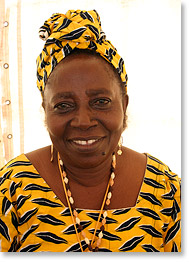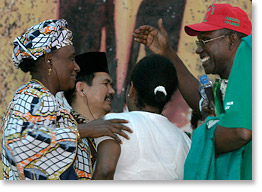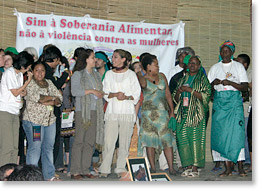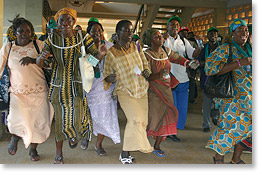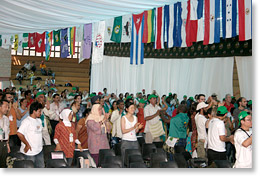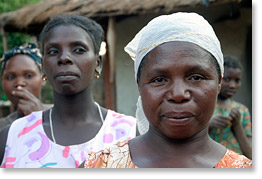|
Interview with Cosma Bulu
of Tanzania’s MVIWATA The Role of Local Markets, the Life of Rural Women |
||||||||||||||||||||||||
To strengthen groups of peasants Cosma Bulu: My name is Cosma Bulu. I come from an organization called MVIWATA. I am a member of the board of directors. There are nine board members and I am the one from the southern region of Tanzania. MVIWATA was established in 1993 and it was registered in 1995. The aim was to strengthen groups of peasants so that the groups can have one voice to defend their rights. It was the main objective. MVIWATA has more than 60,000 members all over Tanzania. There are members in all the regions of Tanzania plus the island of Zanzibar. These peasants are formed into groups. The groups can start from five people onwards. Up to now, MVIWATA has several strategic plans. One is to strengthen the peasants with training seminars and workshops. Also, we enable farmers to engage in economical ventures so as to increase their income. MVIWATA conducts study visits to peasants so that they may go to other peasants to teach what they are doing. For example, we have a center in Mgeta where peasants sometimes come for a study visit. They learn how to use different kinds of seeds from the place where they are coming from and then sometimes they take the seeds and plant them in their areas. MVIWATA is a network of farmers. Also, MVIWATA works with different donors. In Motion Magazine: Do you come from a rural area yourself? Cosma Bulu: No, I come from Lindi urban area. I come from Lindi. There is Lindi urban and Lindi rural. I come from Lindi urban, a town which is along the coast (Indian Ocean) in the south of Tanzania. In Motion Magazine: How many people live there? Cosma Bulu: Forty-eight thousand people. In Motion Magazine: What kind of workshops do you do? Cosma Bulu: We conduct workshops on capacity building, on different issues, for example HIV/AIDS prevention, rural banking, leadership etc. In Motion Magazine: How is access to land in Tanzania? Cosma Bulu: The access to land in Tanzania is not a problem. There are some areas, like Kilimanjaro region in the northern part of Tanzania mainland where there is a lot of land which is well fertile. In Motion Magazine: Is that a good thing for people being able to survive at a family level? Cosma Bulu: Yes, in fact there is no problem of hunger. There are many areas for cultivation and eighty percent of the whole population are peasants. In Motion Magazine: So what are the concerns of the people? Are their particular problems that you are dealing with? Cosma Bulu: There are many, but to mention a few: We want small peasants to form into groups and form a network whereby they can have one voice to defend their rights. We educate them of the importance to access land because there is a possibility of investors accessing a lot and as a result our small peasants will have to suffer the consequences. We teach the small peasants about rural banking. On marketing, there are four markets built by MVIWATA and donors. One is in Mgeta Morogoro, one in Kibaigwa in Dodoma region, one in Igagala in Njombe District, and one in Tanga. These markets are where peasants send their crops for selling and they decide the price of the selling themselves, according to the value of the crops. In Motion Magazine: So, that way, the farmers get a better price? Cosma Bulu: Yes, that is the main objective, that MVIWATA farmers should unite and have one voice, in selling their crops. In Motion Magazine: Can you talk more about the market process? Cosma Bulu: In fact, it is a problem. The peasants can have a big quantity of crops but there is no proper market to sell their crops. Businessmen come to individual peasants to buy their crops at a low price. For example, in the place where I come from we are growing cashew nuts. We don’t know to who and where we are going to sell these cashew nuts and when a businessmen comes to buy he will buy at a very low price compared to what you have invested from the beginning to harvesting. You have spent a lot of money. Now, when it comes to the end, you have to sell these cashnuts at a low price, which is a big problem. Pricing is not good on the part of cashnuts. Other crops we have a problem, although not so much, but I can say that these peasants don’t benefit. They have to sell their crops at a low price. There is no special market. They are only small markets and most of the businesspeople go to the peasants themselves. They buy their maize or rice at a low price. Community meetings / Julius Nyerere In Motion Magazine: How do people in the communities make decisions about what to do? Cosma Bulu: The decision making is done through meetings. If there is a special issue and they want to talk, they call for a meeting and then they point out the issue. If there is any burning issue, they take immediate action. In Motion Magazine: Are these meetings traditional? Have they been going on for generations or it is a new idea? Cosma Bulu: Some are traditional meetings and some are governmental, so it’s not a new idea that they have been done since long. In Motion Magazine: People are pretty happy with that system? Cosma Bulu: In fact, they are. Many problems and issues are being discussed and solved through these meetings. In Motion Magazine: Things are going well in Tanzania? Cosma Bulu: Of course, I can say that we are lucky. We have some problems but not to an extent. They have been solved before they become worse. Tanzania is a peaceful democratic country. In Motion Magazine: Are there things that other people can learn from Tanzania. Cosma Bulu: Yes, they can learn a lot on political issues, on the government leaders. People are free to say anything concerning their government. In Motion Magazine: The late President Julius Nyerere, was he good for Tanzania? Cosma Bulu: We remember him very much. He was a very wise man. He was against corruption. He put more emphasis on democratic leadership. We call him the father of the nation. In Motion Magazine: Did he lay the basis for the good situation that you have today? Cosma Bulu: Yes. There is free education in primary schools. Secondary schools pay very little. Pregnant women and under-five children receive free medication. On part of agriculture, there is an improvement for peasants who are helped by the government with facilities to improve their agriculture and livestock. Peasants are given cows and goats in a group, like a revolving fund. The problem is only money / their own bank In Motion Magazine: Do you think that Tanzania as a whole has food sovereignty; that you are able to make your own food? You don’t have to import it from other countries? Cosma Bulu: We have enough food. Tanzania can feed itself, unless if there is a problem with climate change. In Motion Magazine: You don’t need to import? Cosma Bulu: No. On the part of food, there is no problem. If you go to the market you can choose what you want. The problem is only money. In Motion Magazine: Is there a lot of poverty in Tanzania? Cosma Bulu: Not a lot, but Tanzania is among the poor countries in the world. In Motion Magazine: How can you change that? Cosma Bulu: We can change, but slowly. MVIWATA is one way of changing the people to overcome this situation. There are some areas where MVIWATA is where they have benefitted a lot. They have opened their own bank. Up to now, some have a bought new car. That is one way of overcoming this poverty, building a new house, having shops, livestock, motorcycles. In Motion Magazine: Where did they get the money for the bank? Cosma Bulu: Themselves. Each member makes a contribution. In Motion Magazine: The type of agriculture you use, does that involve traditional methods? Cosma Bulu: There are some people, they use old methods. Others use modern methods. They use a tractor or a cow. (Plau/Maxsai). In Motion Magazine: Do you use pesticides? Cosma Bulu: We try to educate our people not to use these chemicals, although there are some people using it. In Motion Magazine: And what do they say? Cosma Bulu: Some agree because they know the consequences of using chemicals. In Motion Magazine: Do you go from community to community with these discussions? Cosma Bulu: Through workshops, meetings and our magazine produced by MVIWATA (Pambazuko). In Motion Magazine: How many workshops in a year? Cosma Bulu: Depends on our work plan and funds received from donors. In Motion Magazine: Do you reach a lot of people? Cosma Bulu: It depends on the methods used to reach the people. In Motion Magazine: In the discussion of food sovereignty, what are your concerns? Cosma Bulu: There are many things which are of concern. There is the food crisis, the climate crisis, the energy crisis, the financial crisis. In Motion Magazine: Is talking about food sovereignty going to be helpful in Tanzania? Cosma Bulu: Yes, especially on climate. Climate changes are a big problem. On the part of food, the crisis in Tanzania is not much. In Motion Magazine: What have you seen in regards to climate change in Tanzania? Cosma Bulu: The rain is not enough. That is the problem with the climate. The rain comes for a short time and then it goes. As a result, crops dry up, livestock becomes a problem. The weather becomes hot, the environment is being destroyed. Rural women, in fact, they are producers In Motion Magazine: (This question asked by someone in the meeting tent we were in who was listening to the interview.) What about the role of rural women? Cosma Bulu: Yes, rural women, in fact, they are producers. But they can produce very little due to they have a lot of work to do and the poor technology used. The woman has to go to the field for cultivation. When she comes back with firewood on the head, a baby on the back, she has to cook, she has to care for the husband. At the same time, she has to attend the husband. When she says, “I am tired,” he says, “Oh, you are not tired. You are only tired because of cultivating, but not for this.” He doesn’t remember that she has used a lot of energy. That is why we say that woman are being humiliated. They have no say for their own body and they have no say even for what they are producing. The woman is the producer but she doesn’t have any say to say that, “I want to sell this so that I can buy something for myself.” The husband takes the crops and goes to sell. As a result, he doesn’t come home with the money. The money is used for drinking and giving to other women. When the woman asks, “What have you done with the money?” they become aggressive, beating -- big harassment to the women in Tanzania. What I have learned is that the problem of humiliation to women is not only in Tanzania or Africa but in the whole world. (The man who earlier asked a question, says, “What you are saying, the same is in India.”) So, we say, first, for the women, the problem is they are not aware of their rights. We have a big job to create awareness to these women. At least, if they are aware about their rights, they can demand it. But if they are not aware, they will be humiliated daily and there will be no development. In Motion Magazine: This sounds like one of the biggest problems that you have in Tanzania in the rural areas? Cosma Bulu: Yes, it is a big problem. In addition to MVIWATA, I am a coordinator of Lindi Women’s Paralegal Aid Centre, an NGO which assists women and children to demand their rights. We have a big problem in educating these women. Some, they know their rights, but they are afraid to demand for. They are not courageous. That is the problem. But we have to continue, educating, educating. At least, to some extent, they understand a bit. For example, a widow, when the husband dies, the relatives of the husband come and take everything and they say, “Oh, you were just a housewife. Our son is the one who was working, so you go away. Leave the house and go away with your children.” Now, this woman comes to our office and we help to educate her and explain what to do, where to go and demand her rights. There is a problem of divorce. Women are being divorced. The husband chases the wife away. “You go. You have nothing here. I’m going to marry another woman.” So, she goes out without getting anything. In Motion Magazine: How are women going to get their rights? Cosma Bulu: Women will get their rights if they aware of their rights and where to go for demand. In Motion Magazine: The violence against the women that you are describing -- why are the men able to do that? Do they have more power in the family? Cosma Bulu: Of course, the men have the power. The husband says, “I am the head of the family.” He has all the control of the house of each and everything, power over the women, the children, the things which are inside the house. He is the one which is the voice of it and he is the one who paid dowry to marry the women. If the husband divorces his wife, or she is a widow and she wants to demand her rights, we educate them where they should go to demand their rights. For example, they come to our office where we assist them in counseling and advise. As I said, we are paralegals, we are not lawyers, so we just give advice and escort them when they go to the court. We exchange ideas, we exchange seeds In Motion Magazine: Why is your organization part of via Campesina? Cosma Bulu: We have joined Via Campesina because their aims and objectives are the same as MVIWATA. For example, we have come here for the meeting and, first, we mixed with other peasants. We get ideas from what they are doing. Some, they bring seeds which we do not have. We exchange ideas, we exchange seeds. We learn what kind of problems they are having, compared to us, and with what actions they are going to overcome these problems. What are their successes. In Motion Magazine: What experiences of other people have you learned about here? Cosma Bulu: There are so many countries having problems with access to land. This is the main problem. Also marketing, it is a problem. Another thing which I have learned from them is they are doing good in their work. They are also working in groups like MVIWATA. |
||||||||||||||||||||||||
|
Published in In Motion Magazine April 21, 2009 Also see:
|
||||||||||||||||||||||||
If you have any thoughts on this or would like to contribute to an ongoing discussion in the  What is New? || Affirmative Action || Art Changes || Autonomy: Chiapas - California || Community Images || Education Rights || E-mail, Opinions and Discussion || En español || Essays from Ireland || Global Eyes || Healthcare || Human Rights/Civil Rights || Piri Thomas || Photo of the Week || QA: Interviews || Region || Rural America || Search || Donate || To be notified of new articles || Survey || In Motion Magazine's Store || In Motion Magazine Staff || In Unity Book of Photos || Links Around The World NPC Productions Copyright © 1995-2018 NPC Productions as a compilation. All Rights Reserved. |


